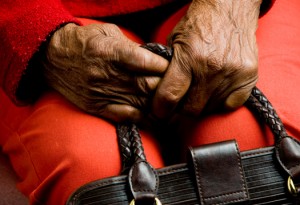
African American seniors could be twice as likely to be the victims of psychological abuse as elders of other races.
A new survey also reveals that African American elders could be up to five times more susceptible to being cheated financially.
Published in The Gerontologist, the survey is among only a few that focus on race as a specific factor in elder mistreatment, says Scott Beach, assistant director of Center for Social and Urban Research (UCSUR) at the University of Pittsburgh.
In addition, the population-based survey collected information directly from senior citizens through face-to-face and telephone interviews, the most effective way to document unreported abuse, he says.
Typically, elder mistreatment data is gathered from complaints filed with Adult Protective Services.
In this way, the study helps fill a noted gap in elder mistreatment research.
The National Research Council, in its 2003 report, Elder Mistreatment, described existing elder abuse research as having “a number of weaknesses,” including a lack of clear, consistent definitions and an absence of population-based data.
The team interviewed 903 adults—a statistically large sample—aged 60 and older living in Pennsylvania’s Allegheny County about instances of psychological abuse and financial exploitation occurring within the past 6 months and since they had turned 60.
The sample contained 210 African Americans, or 23.2 percent of respondents, which is nearly twice the proportion of African Americans living in Allegheny County, Beach says.
Psychological mistreatment includes being yelled at or insulted, having personal property destroyed, and receiving threats of injury, stoppage of care, or being sent to a nursing home.
Among African Americans, 24.4 percent reported being abused since turning 60 and 16.1 percent reported psychological mistreatment within the past 6 months. Around half as many non-black seniors reported abuse with 13.2 percent claiming psychological abuse since turning 60 and 7.2 percent saying it happened within the previous half-year.
Interestingly, African Americans were usually less upset by aggressive behavior, yet more African Americans reported being “extremely upset” when deliberately insulted or when their belongings were destroyed.
African Americans reported even higher instances of financial exploitation, which was defined as having checks stolen, having money tampered with, and being made to sign documents they did not understand.
Only 8.4 percent of non-African American elders reported being cheated since turning 60 and a mere 2.4 percent said it happened within the past 6 months. On the other hand, 23 percent of African Americans claimed that someone meddled with their money since they turned 60 and 12.9 percent said it occurred recently.
Most striking about the results was that the racial disparity in mental abuse or financial exploitation was not explained by additional factors such as education, health, age, or socioeconomic status, Beach says.
On average, African Americans in the survey tended to be slightly younger, less educated, and more likely to be single, divorced, or widowed.
Nonetheless, non-African Americans of similar means, years, schooling, and marital status were still less likely to report mistreatment or financial deceit.
Beach plans to follow up on the survey by including seniors from other parts of the country, interviewing the perpetrators, and developing more standardized definitions of the various types of psychological mistreatment and financial exploitation.
Source: Futurity/University of Pittsburgh








